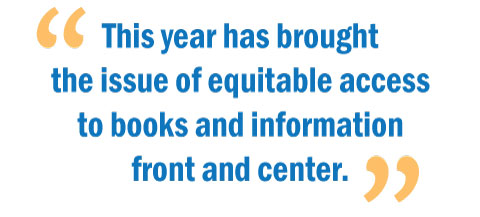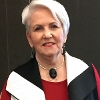A Nosy Paraprofessional: When An Employee Peeks at Student Internet Searches | Scales On Censorship
Pat Scales offers advice and opinion on student privacy, tween advisory boards, labeling, and serving students during the pandemic.
I am a children’s and teen librarian at a small public library. We have been closed for programming due to COVID-19 and have used this time to address issues that have arisen about our regular services. We do weekly programs for preschool and school-age children up to 11, and monthly programs for teens ages 12–17. A parent of a 12-year-old recently questioned a program we did for teens. She didn’t feel the program was age appropriate for her son. What is your suggestion?
This question has come up several times. Twelve-year-old patrons feel too old for children’s programming, and they are sometimes too immature for programs that target older teens. You don’t want to lose middle school–age library users. Consider at least two teen programs a month, and make sure one targets this younger group. This offers a choice, and everyone wins. Think about forming a programming advisory board of patrons ages 12–14. Let them tell you the types of programs that would interest them.
 I’m in graduate school to become a school librarian. One of my assignments is to find out the most pressing issues related to intellectual freedom in school libraries. From your experience, what are these issues?
I’m in graduate school to become a school librarian. One of my assignments is to find out the most pressing issues related to intellectual freedom in school libraries. From your experience, what are these issues?
I hear from a number of graduate students studying to become librarians, and I’m happy that so many want to know and understand intellectual freedom topics. Book censorship is always a problem in school libraries. But this year has brought the issue of equitable access to books and information front and center. Virtual school has left school librarians scrambling to provide resources to students who don’t have access to the internet. Many schools have found creative ways to serve these students, but some rural schools still struggle to bridge the divide. This puts these students at a disadvantage. Public libraries can help, but some students don’t have transportation or parental support to get them there.
Labeling is another ongoing intellectual freedom issue in schools. There is a tendency in school libraries to limit students to books on their reading level. Some argue that this type of restriction is justified since the purpose of a school library is to support the curriculum. I don’t believe in this argument. What about a child who may be borrowing a book for their parent to read aloud? Think about a student who is motivated to read a particular book because they are interested in the subject. Good reader guidance can solve this problem. Suggest that students borrow several books at a time. This way, they’ll leave with titles they can read easily and others that appeal to their interests. Content labeling is a very serious issue in school and public libraries. Libraries should remain viewpoint neutral.
I refer you to the Intellectual Freedom Manual published by ALA’s Office for Intellectual Freedom for a more thorough discussion of all the issues affecting school libraries.
I’m a high school librarian, and I’m having trouble with a paraprofessional employee looking over the shoulder of students as they conduct searches on the internet. She became very angry when I reminded her that she isn’t to do that. Is this a problem in other schools, and what should I do?
Unfortunately, this is a problem in school and public libraries. You did the right thing to address this issue with the employee. School districts and public libraries should conduct training for nonprofessional staff. This problem should be documented in staff evaluations.
I read your September column “When Kids Can’t Afford Books During the Pandemic” and was wondering if you know about “EPIC for Kids.” It is free to librarians and teachers. Our schools are all virtual, and we use this resource to get fully digitized books for our book club participants.
Thank you so much. This librarian also told me that their school has hot spots available for those who cannot afford the service. Perhaps this should be a model for school districts as they seek partnerships to better serve students.
 Pat Scales is the former chair of ALA’s Intellectual Freedom Committee. Send questions to pscales@bellsouth.net.
Pat Scales is the former chair of ALA’s Intellectual Freedom Committee. Send questions to pscales@bellsouth.net.
RELATED
The job outlook in 2030: Librarians will be in demand
The job outlook in 2030: Librarians will be in demand
ALREADY A SUBSCRIBER? LOG IN
We are currently offering this content for free. Sign up now to activate your personal profile, where you can save articles for future viewing






Add Comment :-
Be the first reader to comment.
Comment Policy:
Comment should not be empty !!!